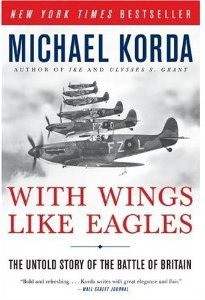When I was unpacking at home the 37kg of luggage I had with me from Boston, Ling made a remark that I thought was fun:
“Wow dear; you really bought a lot of stuff there this time.”
And just to put her remark in context; I’d left Singapore with just 23kg of luggage!
She’s right that I did buy a lot more things on this trip than I’ve ever before did. Heck. In all the under a month trips I’ve made in the last decade, the most I’d ever returned with would be one or two shirts, and an equivalent number of fridge magnets.
This time, I returned from Boston with, among other things, a new jacket, two polo-shirts, three T-shirts, an umbrella, three mugs, several toys for Hannah, so many fridge magnets that they weighed about a kilogram in net weight, and ten books –a few of which are really heavy.
 One book that I picked up from Borders at the intersection between School and Washington streets was With Wings Like Eagles by Michael Korda, a London-born author who once was the editor-in-chief of Simon & Schuster in NYC, and currently today lives in the city.
One book that I picked up from Borders at the intersection between School and Washington streets was With Wings Like Eagles by Michael Korda, a London-born author who once was the editor-in-chief of Simon & Schuster in NYC, and currently today lives in the city.
Accounts of leaders in the face of adversity have always fascinated me. This book looks at the three month-long Battle of Britain in 1940, but from the perspectives of leading politicians and military leaders of countries who were involved in it. I’m aware that for many of us, or at least those of us who might read this blog occasionally, the only persons who might be even familiar would be Winston Churchill and Adolf Hitler.
But without getting into too much detail in this post, the individual whose decisions had the most impact on the historical fact that England did not get overrun that year was neither person. Rather, it was a British officer, Hugh Dowding, who was placed in command of the small number of British fighter planes who had the very difficult job of stopping the Germans from attaining air superiority before actually invading the isles.
The book maintains a high level of discourse; exploring the conflicts and circumstances between Churchill and Dowding, of Dowding and his commanders, and their individual personalities. Unfortunately, despite that history would had been very different had Dowding not had the moral courage and foresight and gone against Churchill to make the decisions he did then, he was eventually given the political shaft by his rivals and enemies, an outcome he became extremely bitter about in his remaining years after the war.
It was more than a little sad to read in the last chapters of his fall from grace and from great heights of achievement, the more so that his political assassination seemed more from spite from his detractors and rivals than through any real character failings on his part.
I was reading With Wings Like Eagles initially slowly – several pages at a time – each morning over breakfast at Blue’s, then finished the remaining half of the book on a single shot over the long flight home from Boston to Singapore.
The next historical book I’m reading now I picked up from the Harvard University bookstore, and it’s about four American and Japanese officers and how their lives and careers got intertwined. More on it later.:)
Recent comments